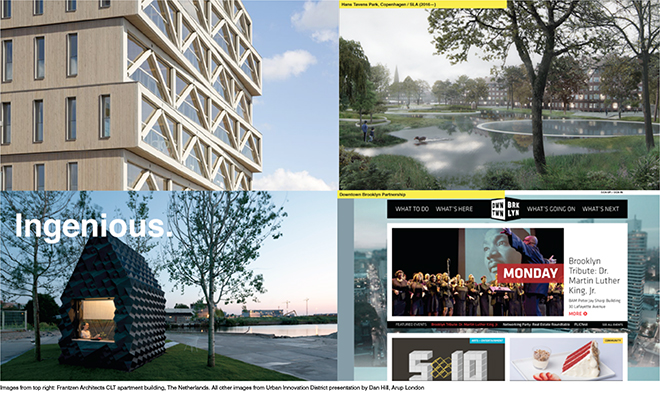Semester 1 2017 Studio 25
Urban Eco Acupuncture
Urban Innovation District
Dr Michael Trudgeon and Professor Chris Ryan
“Our vision is to develop a world class urban district and environment that supports and develops “next generation Melbourne” – a place designed to leverage emerging technologies and innovation, and build on our city’s unique characteristics to enhance education and economic outcomes, create new knowledge and city experiences, and enrich inclusion and public amenity.” - Tom Bentley, Principal Advisor to the Vice Cancellor, RMIT University.
Studio Outline:
The intention of this studio is to build a transdisciplinary understanding of the role of design within a complex ‘wicked problem’ framework. This studio will address the strategic objectives developed by the Urban Innovation District stakeholders. Their thematic emphasis is on creating an experimental precinct or Living Laboratory to test new design propositions at different scales and in different disciplines from urban design and architecture to service and system design. The studio themes will address ecological and economic sustainability. Learn to communicate with other design and consulting disciplines. The complexity of the challenges requires a multi-disciplinary perspective. The studio brings together students and professionals of architecture, landscape architecture, building technology, urban design and planning from Australia and Europe. It builds on VEIL’s well established academic and professional network. Learn to engage with, understand and communicate to ‘live’ clients. Through workshops, students will develop a general understanding of the challenges facing this district. They will then develop a design vision for a sustainable Urban Innovation District focusing, in smaller groups, on specified sites as potential locations for this round of Urban Eco Acupuncture interventions.
Studio Leaders
Dr MICHAEL TRUDGEON is the Deputy Director, VEIL, Faculty of Architecture Building and Planning at the University of Melbourne. He is responsible for delivering the VEIL Eco-acupuncture design studio teaching program to Masters of Architecture program at UoM. He is design director at Crowd Productions, a Melbourne based architecture and industrial design studio. His practice background is in developing strategies to prototype new technology and spatial solutions for commercial architecture projects.
PROFESSOR CHRIS RYAN, Director of the Victorian Eco Innovation Lab (VEIL) at the University of Melbourne, has worked for over 30 years across various areas of science, technology, environmental policy and design, and in projects that span the community sector, academia, government and international agencies and business. In academic work he helped found the first multi-disciplinary undergraduate socio-environmental degree program at RMIT University that spanned two faculties (Social Science and Architecture and Design). That program ran from 1984 to 1997. He was foundation professor of Design and Sustainability at RMIT from 1990, and Director of the National (Key) Centre for Environmental Design from 1989-98. In this position he directed the National EcoReDesign program, and ARC Linkage and ERDC project, working with 20 Australian companies to develop a new eco-design methodology and bring new greener products into the market.
Learning Outcomes:
The studio will begin with group research work looking at and mapping key characteristics of the Urban Innovation District. Tutorials and lectures will be provided by stakeholders from Melbourne City Council, The Queen Victoria Market, Arup, RMIT and the University of Melbourne in the first 5 weeks. Students will then develop individual project briefs and design outcomes based on information provided through the initial research and engagement work. The studio will emphasise the use of physical model making in the development of concept designs, spatial interrogation and the communication of design outcomes to stakeholders. Students will be expected to spend a considerable time on site and we are also seeking to hold the studio sessions on site.
Reading and Reference:
- Niklas Maak. 2015. Living Complex. From Zombie City to the New Communal.
- Munich, Hirmer. Horst Rittel and Melvin Webber. 1973. Dilemmas in a General Theory of Planning. Scotland. Policy Sciences 4.
- Bruce Katz and Jennifer Bradley. 2013. Metropolitan Revolution. How Cities and Metros are Fixing Our Broken and Fragile Economy. New York. Brookings Institution Press.
- Professor Chris Ryan et al. 2016. Scenarios 2040. Results from the second year of Visions and Pathways 2040. Scenarios of Low Carbon Living. Sydney. Low Carbon Living CRC.
ST1/25 Thursday 9:15am - 12:15pm, MSD Room 237
ST2/25 Thursday 12:15pm - 3:15pm, MSD Room 237